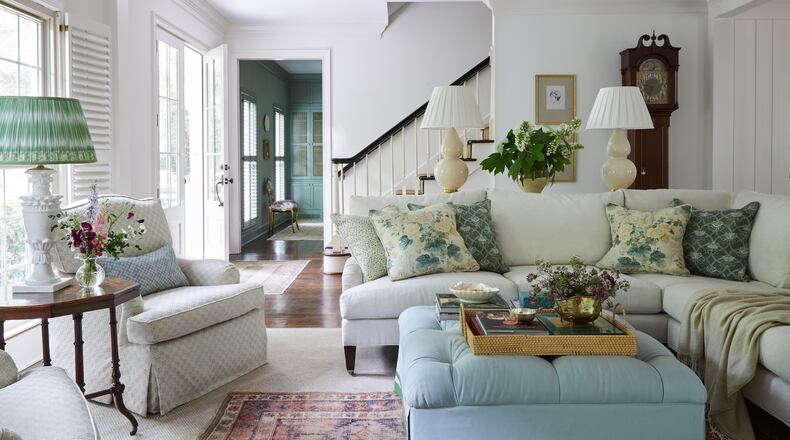TikTok has been abuzz lately over the “cozy girl” aesthetic. It’s a vibe defined by chunky sweaters, warm autumnal shades in clothing and makeup and the kind of comfy, relaxed outfits perfect for a chilly winter day.
But the urge for coziness isn’t limited to fashion-forward girls. With cold weather upon us and more time spent indoors, take the opportunity to get your hygge on and embrace all the ways you can bring cozy into your home.
The Danish concept of hygge (pronounced hoo-ga) has become central to our understanding of coziness. Hygge is founded on things that bring comfort, from a steaming cup of hot tea (preferably enjoyed before a roaring fire), and a picture window offering a view of snow falling quietly outside, to your softest slippers or a living room in winter time illuminated with candlelight. But it turns out a yearning for coziness is universal: Dutch, German, Canadian and Norwegian culture all have comparable words that convey this idea of hominess.
There is also science behind what makes us feel cozy in our home interiors. University of Pennsylvania Perelman School of Medicine professor of neurology Anjan Chatterjee has found in his studies what many designers and influencers also know. For example, plants are one element that can make a home feel “homier.”
Atlanta interior designer Bailey Ward is a big proponent of cozy and has many ideas for how you can lean into a more relaxing, comfortable and welcoming cozy aesthetic no matter what your budget.
Focus on soft, warm lighting
“I don’t think that you can have too many lamps,” said Ward. “If I was designing a new build from the ground up for myself, I would only put can lights in the kitchen and in the bathroom.” Ward even likes to place lamps in the bathroom for a flattering, welcoming mood. Ward recommends 2700 Kelvin lighting for the warmest glow and prefers a 20-watt bulb in the bedroom for the coziest feel.
Decor with personality adds coziness
Whether it’s a gallery wall featuring some of your favorite photographs, paintings and prints or a bookshelf lined with favorite novels, collecting is very in keeping with the cozy aesthetic. “Fill all your surfaces and your bookshelves with things that are sentimental to you,” advised Ward.
Credit: Heidi Harris Photography
Credit: Heidi Harris Photography
Use wool rugs
Natural fibers of every sort are extra cozy and Ward is especially fond of wool rugs. “They’re just a lot softer underfoot, and the natural material adds so much coziness.” Rug placement is important too, Ward said. “Rugs should fill the room. At a very minimum the front feet of each piece of furniture should sit on the rug.”
Throw blankets
As with your rugs, aim for natural fiber throws and keep a selection close to your sofa in a big basket. Cashmere is ideal, if you can afford it, but Ward is also a big fan of Lands Downunder herringbone cotton blend blankets from Italy
Candles everywhere
Much like lamplight, candlelight is a mood enhancer.
Welcome your guests
Ward likes to provide an amenities basket in her guest room filled with toiletries and water and always makes sure there is a candle in the guest room along with freshly laundered linens.
Arrange furniture for conversation
Spare rooms with too little furniture are more foreboding than cozy. Designers recommend pulling furniture together to create areas ideal for conversation. Also provide plenty of side tables and surfaces to rest drinks. “You don’t want to be sitting 20 feet across the room from someone,” said Ward.
Choose paint colors with warm undertones
Whether you favor clean white walls or warm green ones, make sure that the paint color you choose features a warmer, yellow undertone rather than a cooler, blue undertone said Ward.
Credit: Heidi Harris Photography
Credit: Heidi Harris Photography
Add pillows
Pillows on your living room couch and chairs add an extra layer of comfort. Most big box throw pillows come with cheaper polyester or foam inserts. Ward recommends switching those out with down pillow inserts for the plushest, most luxurious feel and a pillow that conforms to the body.
Embrace the ottoman
Invest in a large ottoman so guests can put their feet up or perch close to friends. Ward likes her ottoman on wheels.
Wood spells warmth
There is no denying the added value installing hardwood floors brings to a home. Ward also likes using wood paneling to add a similar cozy vibe to a room.
Drapery is key
Beautiful curtains soften and add warmth to a room, especially when layered with Roman shades. For a less pricey option, Ward likes woven wooden shades which allow you to control the light in the room and add interest to windows.
Credit: Heidi Harris Photography
Credit: Heidi Harris Photography
Built-ins lend character
Especially key for new builds which may not have as much character as old houses, is adding built-ins — extra points if you add books. “If you don’t have built-ins, add stacks of books to a console table, chest or add an antique magazine rack to the room,” said Ward.
Bring in nature
As neurologist Anjan Chatterjee has noted, plants add coziness. “Fresh florals or plants add texture and bring nature in which is comforting and cozy,” said Ward.
Felicia Feaster is a longtime lifestyle and design editor who spent 11 years covering gardening, interior design, trends and wellness for HGTV.com. Felicia is a contributor to MarthaStewart.com and has been interviewed as a design expert by The New York Times, Forbes and the Associated Press.
About the Author
Keep Reading
The Latest
Featured





